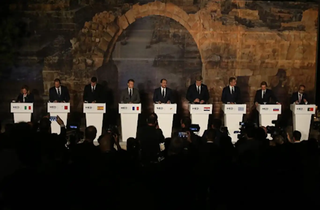The meeting focused on conflicts in the Middle East, the war in Ukraine, migration, and climate change.
Croatian Prime Minister Andrej Plenković stressed the importance of cooperation among Mediterranean countries to tackle challenges such as migration and regional conflicts, particularly de-escalating tensions between Israel and Palestine. The participation of Jordanian King Abdullah II highlighted Jordan's crucial role in maintaining stability in the Middle East.
Plenković emphasized the need for increased European engagement in the region, including humanitarian aid and support for countries affected by conflicts, such as Jordan. He also discussed financial aid for refugees in Jordan and infrastructure projects to improve living conditions. Croatia, as an EU member and Mediterranean state, plays a significant role in addressing migration flows.
The war in Ukraine was another key topic. Plenković reiterated Croatia's support for Ukraine in its resistance to Russian aggression, drawing on Croatia's own historical experience. He criticized divisions within Croatian politics fueled by President Zoran Milanović's differing narratives about the conflict.
At bilateral meetings, Plenković discussed strengthening economic and security cooperation between Croatia and other Mediterranean countries. Croatia will host the next EU MED-9 summit in 2026, further solidifying its position in the region. The appointment of Dubravka Šuica to a new role in the European Commission will enhance Croatia's involvement in European efforts in the Mediterranean.
The summit provided an opportunity to exchange views on the EU's future steps in the Mediterranean, focusing on economic and security challenges. Leaders agreed on the need to strengthen capacities for emergency interventions in cases of natural disasters and migrant crises. Cyprus proposed establishing a regional firefighting center to enhance the region's emergency response capabilities.
A joint declaration was issued, reaffirming member states' commitment to strengthening regional cooperation, increasing the competitiveness of the European economy, and enhancing the strategic autonomy of the European Union. This includes investing in renewable energy, reducing dependence on external suppliers, and increasing capacities for emergency interventions.
Cyprus, as the host, highlighted its important role in regional issues, particularly climate change, migration, and security challenges. Cypriot President Nikos Christodoulides emphasized the importance of regional cooperation in addressing global challenges and stated that the future of the European Union is closely linked to the development and stability of the Mediterranean region. (ILKHA)



 Güncel
Güncel
 Dünya
Dünya
 Güncel
Güncel
 Güncel
Güncel
 Güncel
Güncel
 Dünya
Dünya
 Dünya
Dünya
 Dünya
Dünya
 Güncel
Güncel
 Güncel
Güncel





